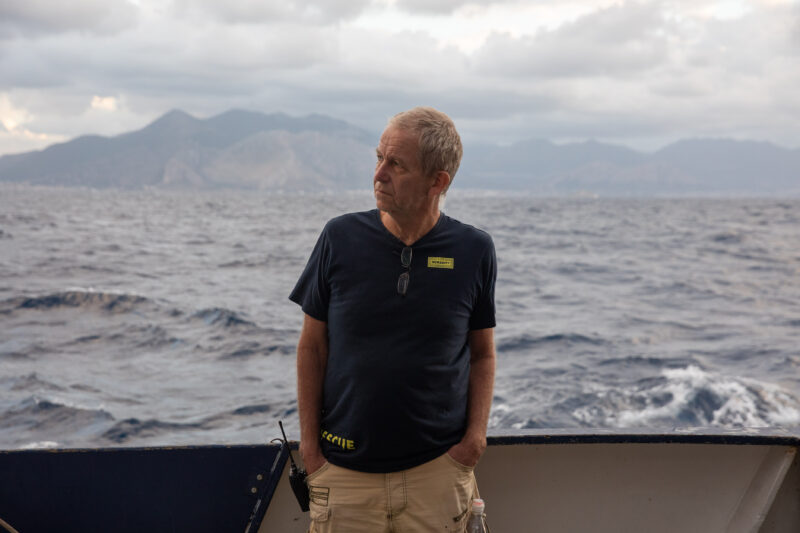“Europe would like to isolate itself, but not with us.” Joachim on his responsibility as captain

During our next rescue operation in October 2024, Joachim will be the captain on board Humanity 1. He has been working for SOS Humanity since the end of 2022 and was already on board the ship before that. We meet him in the port of Syracuse, Sicily, during the ongoing preparations for the next mission.
What motivated you to get involved in civil search and rescue?
I worked as a captain on cargo ships for a long time. Of course you realise what’s happening in the Mediterranean.
It was important to me to do something about this, because we realised from the start that it is possible if you just want to. The Italian Coast Guard launched the Mare Nostrum rescue operation in 2014 and they rescued a lot of people and organised it very extensively and professionally. Since that was no longer politically desirable [and Mare Nostrum was stopped], I thought it was good that I could get involved. In fact, this work has politicised me more and more. I see how the whole discussion is shifting, and migration is being portrayed as a threat, even in the public media. This has taken on a dimension for me that makes me say: “We can’t look away from this. Europe would like to seal itself off, but not with us.”
Right now, we are in port, but soon we will be setting off again: What are your current tasks and what will you be doing during the operation?
I am always responsible for keeping the ship running. If someone doesn’t know what to do, they come to the captain. So, I have to think about what I would do in any situation, including emergencies. Right now, in port, there are a lot of administrative tasks: I have to make sure that the crew and visitor lists are up to date, regular safety drills are carried out and ultimately, I am also responsible for ensuring that there is enough food, fuel and water on board. That’s all under my supervision.

During the mission, I’m responsible for ensuring that the navigation is safe: I have to make sure that we have a travel plan. I also communicate with the authorities if necessary. I then spend an incredible amount of time on the phone. For example, I try to contact the Maltese Rescue Coordination Centre when we are in the Maltese search and rescue zone. Like the Libyan Rescue Coordination Centre, they never actually answer the phone. That’s an absurdity, because it’s their job to answer emergency calls and not ignore them.
What do you like about your work?
I like the ship, which is not necessarily a given. SOS Humanity has carried out the right conversions that the ship needed to be a proper rescue vessel. I think it’s great that the organisation has really changed the ship. The ship and the crew have to work well together, you can tell that this is the case here. That’s what makes it fun for me to sail on a ship like this.

What are the challenges or difficult moments?
As soon as the so-called Libyan Coast Guard comes into play during operations, it becomes difficult. Making the right decisions at these moments to rescue people and prevent them from being illegally sent back to Libya can quickly become challenging. It can also happen that we have two distress cases that are both roughly the same distance away. Where do we go first? We can’t rescue both at the same time, but only one after the other. Sometimes we don’t have the criteria to know for which boat the rescue is more urgent. With the support from civil aircrafts, this has become easier. They can sometimes give us an idea of the condition of the boats, so that we first go to the one that looks worse. But if I don’t have these criteria and then hear later that the other boat may have sunk or been sent back to Libya, those are difficult moments.
What are you looking forward to on your next rescue operation?
I’m looking forward to having a great crew again. During training, it’s always nice to see how the marine crew and the rotation crew grow together into one crew.
Otherwise, we’re not looking forward to what we’re doing here, it would be nicer if we didn’t have to do it at all, that’s for sure.
[This interview was carried out by Hannah Förster and Louis Klausnitzer, (online) communication interns at SOS Humanity, on board the Humanity 1].


